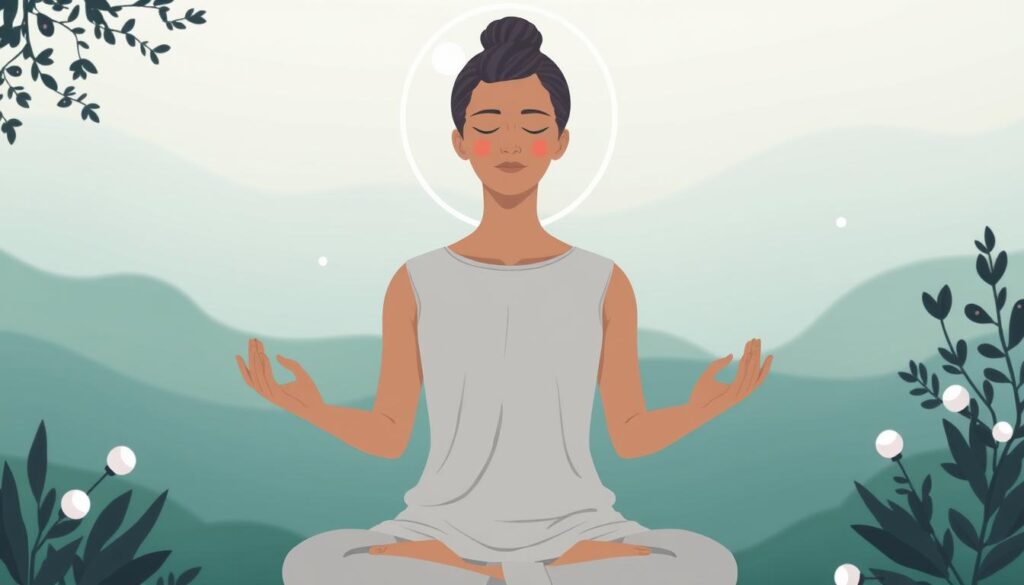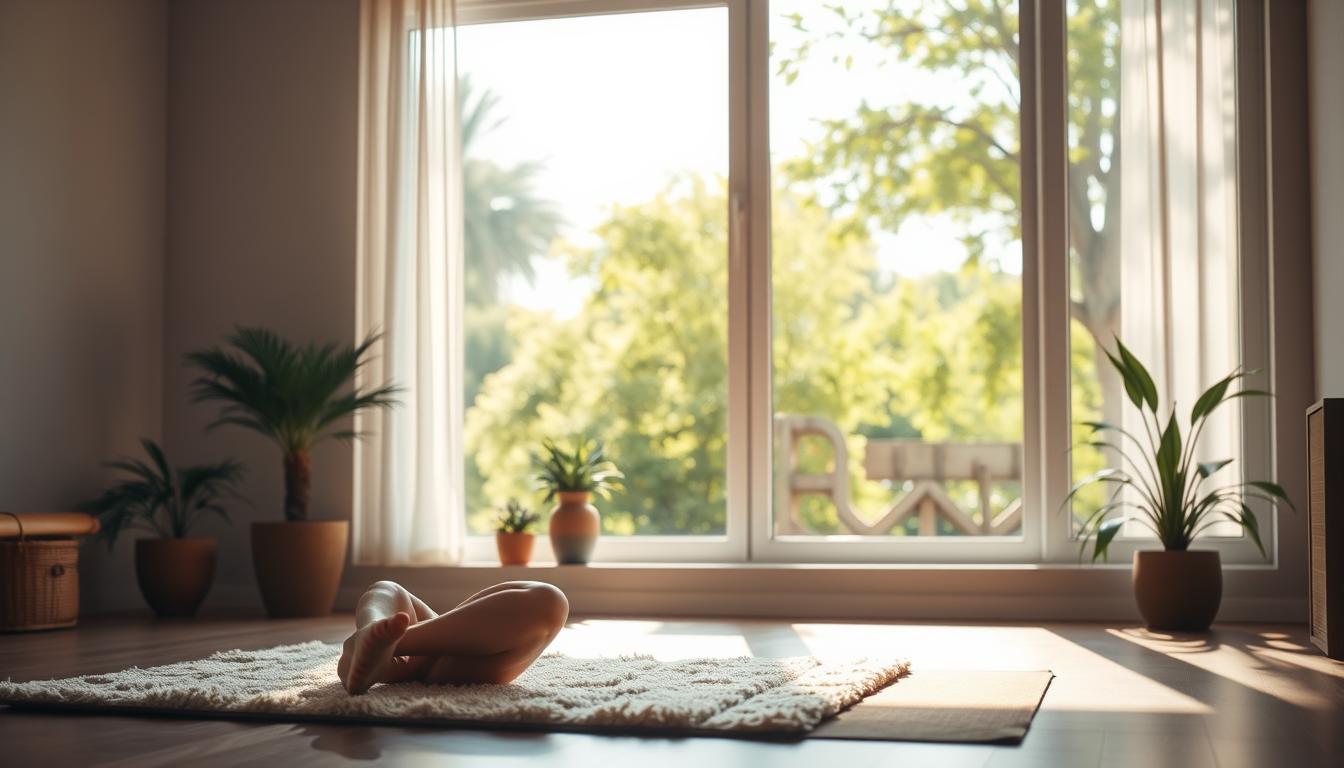I still remember the days when stress would get the best of me – my mind was a constant whirlwind, and I felt like I was losing control. That’s when I started looking into practices that could help me regain my balance. I began to explore meditation and yoga, and I was surprised by how much they improved my mental health.
As I delved deeper, I found that these practices are not just about relaxation – they are powerful tools for enhancing our overall health and dealing with the stress of modern life. Meditation, for instance, has been practiced for thousands of years, and its roots in ancient traditions have evolved into evidence-based practices that are now recommended by healthcare professionals.
As we will explore, setting aside just a few minutes each day for meditation can create meaningful changes in our mental health, regardless of whether we’re beginners or experienced practitioners. The concept of mindfulness is central to both meditation and yoga, and developing this skill can transform our relationship with our thoughts and emotions.
Key Takeaways
- Understanding how meditation and yoga impact our mental wellbeing
- Learning how to incorporate meditation into our daily life
- Discovering the role of mindfulness in meditation and yoga
- Exploring the relationship between meditation and yoga as complementary practices
- Finding out how these practices can help cope with stress and anxiety
The Science Behind Meditation and Mental Health
Delving into the science behind meditation reveals its significant impact on our mental wellbeing. Research has shown that meditation can lead to changes in areas of the brain associated with memory, self-awareness, and stress regulation.
How Meditation Changes the Brain
Studies have demonstrated that regular meditation practice can reshape key areas of the brain, including the prefrontal cortex, amygdala, and hippocampus. These changes can lead to improved cognitive function and emotional regulation.
- Reduced stress and anxiety
- Improved emotional regulation
- Enhanced self-awareness
Research-Backed Mental Health Benefits
Research has confirmed that meditation can bring numerous health benefits, including reduced symptoms of anxiety and depression, and improved mental health. A study by Johns Hopkins University analyzed 19,000 studies and found that mindful meditation can help ease psychological stresses.
Some key findings include:
- Reduced cortisol levels
- Improved cognitive function
- Enhanced mental wellbeing
5 Powerful Ways Meditation for Mental Health Transforms Your Mind
As we delve into the world of meditation, it becomes clear that its effects on mental health are multifaceted and significant.
Reducing Stress and Anxiety
Meditation decreases stress and anxiety by creating a buffer between triggers and our response.
Improving Focus and Attention
Regular meditation trains the brain to focus, improving productivity and reducing mental fatigue.
Enhancing Emotional Regulation
Meditation helps develop a healthier relationship with our emotions, creating space between feeling and reacting.
Decreasing Symptoms of Depression
Meditation alleviates depression symptoms by interrupting negative thought patterns and promoting neurochemical balance.
Promoting Self-Compassion and Awareness
Meditation cultivates self-compassion by teaching us to observe thoughts without judgment, fostering a kinder internal dialogue.
These benefits are interconnected, creating a comprehensive approach to mental wellbeing. By incorporating meditation into our daily routine, we can experience these transformative effects.
- Meditation reduces stress and anxiety.
- It improves focus and attention.
- Enhances emotional regulation.
- Decreases symptoms of depression.
- Promotes self-compassion and awareness.

Essential Meditation Techniques for Better Mental Wellbeing
Discover the power of meditation with these essential techniques for better mental wellbeing. Meditation is a versatile practice that offers various methods to improve mental health, and understanding these techniques can help you choose the best approach for your needs.
Mindfulness Meditation
Mindfulness meditation is a practice that involves being fully present in the moment, observing your thoughts without judgment, and cultivating awareness of your surroundings. This technique is particularly helpful for reducing stress and increasing focus.

Loving-Kindness Meditation
Loving-kindness meditation focuses on developing love, compassion, and kindness towards yourself and others. By practicing this technique, you can enhance your emotional regulation and foster a more positive outlook on life.

Body Scan Meditation
Body scan meditation involves mentally scanning your body to identify areas of tension and relaxation. This technique helps release physical stress and promotes overall relaxation.

Breath Awareness Meditation
Breath awareness meditation centers on your breathing, using it as an anchor to calm your nervous system and bring your attention back when your mind wanders. This simple yet effective technique is ideal for beginners.
An image representing breath awareness meditation
Progressive Muscle Relaxation
Progressive muscle relaxation involves tensing and relaxing different muscle groups systematically. This technique combines physical and mental relaxation, helping to release stress and promote overall wellbeing.
An image of a person practicing progressive muscle relaxation
How Yoga Complements Meditation for Complete Mental Health
I have found that incorporating yoga into my meditation practice has been a game-changer for my mental health.
Yoga creates a powerful bridge between meditation and physical activity, offering mental health benefits that neither practice can fully achieve on its own. By fostering a unique mind-body connection, yoga works in tandem with breath awareness to calm the nervous system.
The Mind-Body Connection in Yoga
The mind-body connection in yoga is rooted in the idea that physical postures (asanas) and breath awareness can have a profound impact on our mental state.
By practicing yoga, we can release tension in areas where we physically store emotional stress, promoting a sense of balance and wellbeing.
Yoga Poses That Reduce Anxiety and Depression
Certain yoga poses are particularly effective for reducing anxiety and depression.
These poses work by releasing tension in the body, improving blood flow, and promoting a sense of relaxation. Some of these poses include those that focus on improving posture and body awareness, making seated meditation more comfortable and effective.

Conclusion: Creating a Sustainable Meditation and Yoga Practice
Creating a daily meditation practice, even if it’s just a few minutes a day, can be a game-changer for our mental health. To make meditation a habit, consistency is key. Start with 5-10 minutes a day and work it into your current routine – for example, after you wake up but before you brush your teeth.
As you grow more comfortable with meditation, you can extend the duration. It’s better to meditate for a short time every day than for a long time only once a week. Research has shown that regular meditation practice can bring numerous benefits to our mental health, including reducing stress and anxiety, and decreasing symptoms of depression as supported by recent studies.
By incorporating meditation and yoga into your daily routine, you can cultivate compassion for yourself and others, improving your overall mental wellbeing. As you continue on this journey, remember that it’s not about achieving perfection, but about making progress and being mindful of your thoughts and emotions every day.
FAQ
What are the benefits of regular meditation practice?
Regular meditation practice can help reduce stress and anxiety, improve focus and attention, enhance emotional regulation, and promote self-compassion and awareness – all contributing to better mental wellbeing.
How do I start a meditation practice if I’m new to it?
Start by setting aside a few minutes each day to sit comfortably, focus on your breath, and let your mind wander – don’t worry if it wanders, just bring it back. You can use guided meditation resources or apps to help you get started.
Can meditation help with depression and anxiety?
Studies have shown that meditation can help decrease symptoms of depression and anxiety by promoting relaxation, improving emotional regulation, and increasing self-awareness – but it is not a replacement for medical treatment.
What is the best type of meditation for stress disorder?
Mindfulness meditation and loving-kindness meditation are often used to help manage stress and anxiety, as they promote relaxation and help you stay present in the moment.
How can I incorporate meditation into my busy daily routine?
Try incorporating short meditation breaks into your day, such as during your lunch break or right before bed – even just a few minutes can make a difference. You can also combine meditation with other activities, like yoga or walking.
Can yoga be used as a form of meditation?
Yes, yoga can be a powerful tool for meditation, as it combines physical movement with mindfulness and breath awareness – helping you cultivate a deeper connection between your mind and body.
